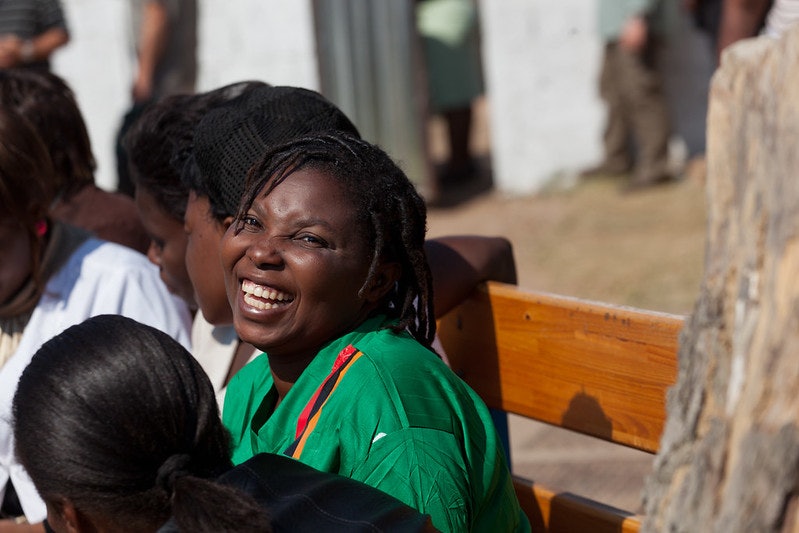On President George W. Bush’s trip this month to Africa, he underscored the importance of sustaining American foreign assistance programs in Sub-Saharan Africa. Economic development initiatives in Africa likewise are critical to the stability of the region and in America's interests.
On President George W. Bush’s trip this month to Africa, he underscored the importance of sustaining American foreign assistance programs in Sub-Saharan Africa. He pointed to the success of health programs like PEPFAR and Pink Ribbon Red Ribbon in saving and improving millions of lives.
Economic development initiatives in Africa likewise are critical to the stability of the region. Similarly, they are in America’s interest when they open markets to our goods and create prosperous economies.
A good example is the African Growth and Opportunity Act (AGOA), which Congress passed in 2000. Targeted at Sub-Saharan Africa, the program fosters market-based economic growth and develops trade relationships by providing eligible nations duty-free access to the U.S. for certain products. AGOA ensures African entrepreneurs can take advantage of access to the U.S. market at no cost to U.S. taxpayers.
As good as the program has been, it is not enough. Changing circumstances and impressive investments by China necessitate the U.S. increase its economic engagement in Sub-Saharan Africa. This means broadening eligibility, opening additional sectors of the U.S. market, and strengthening programs that encourage sustainable economic growth.
Efforts like these have their skeptics, but here are three reasons increased economic investment in Africa matters for the U.S:
Strong Economic Growth
Sub-Saharan Africa experienced strong economic growth in the years since AGOA passed. For example, average GDP growth in the region was two points higher than the world average from 2001-2013. The growth also was significantly higher than in the decade before AGOA was passed.
What’s more, the World Bank predicts even greater growth for a rapidly-developing region that is ripe for more foreign investment. Not surprisingly, other nations have taken note.
China particularly poses a serious threat to Africa’s development and the U.S.-led global economic order. Unlike U.S. assistance, China’s engagement does not encourage African governments to fight corruption, work for gender balance, promote fiscal sustainability, or strengthen regional economic integration.
China, which invests more in Africa than any other country, channels its funds toward infrastructure and investment development projects. As a result, positive sentiment toward the Chinese model of development is steadily growing. As U.S. trade with Africa has stagnated, China has surpassed the U.S. as the continent’s largest trading partner. China is also rapidly acquiring African companies, with the majority of these in the commodities sectors.
As long as we content ourselves with a one-way relationship and limited investment, China will continue to out-compete the U.S. for the opportunity to help Africa reach its potential. It’s time to move beyond AGOA and compete more rigorously with China.
Millennial Boom
The opportunity, and the risk, in Africa is staggering. Never before in history has there been so many young people. With 200 million people between the ages of 15 and 24, a figure anticipated to double by 2045, Africa has the youngest population in the world. The continent stands at the early stages of a demographic explosion that has the potential to be politically destabilizing for the coming decades.
The millennial generation is the most educated to date, but African youth are twice as likely to be unemployed upon entry to the workforce. That’s due to the absence of opportunity and access to markets.
With rising rates of interpersonal violence and HIV/AIDs transmission among adolescents, lack of investment strengthens instability. That is a point for concern considering the connections between rising rates of disaffected youth and social and political crisis.
To achieve prosperity, every citizen must have equal opportunities to maximize their potential. Economic investments such as AGOA encourage the growth and development that will be necessary for Africa to capitalize upon the skills and capacity of young people.
Empowering Female Entrepreneurs
There are more women entrepreneurs across the continent of Africa than anywhere else in the world. In places like Ghana, Nigeria, and Zambia, women business owners outnumber their male counterparts. This is a significant statistic as women reinvest the majority of their income into their families and communities.
When women have equal access to the economy, their children are healthier and more educated, their communities more prosperous, and their countries more stable. Global economic integration in Africa, especially for women, creates a ripple effect, breaking poverty cycles and ensuring stability at local, national, and global levels.
Yet despite the influence of women-owned start-ups in the region, market barriers and lacking financial support limit the potential for development and scale. In helping to address these obstacles, increased investment in economic initiatives paves a direct pathway to gender empowerment across the region. The resulting inclusive growth will promote social and political stability, cushioning the demographic challenge noted above, and open market opportunities for American trade and investment.































